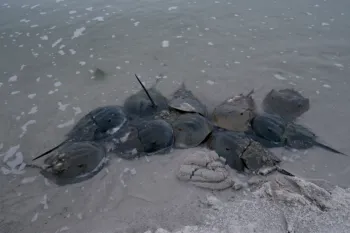WASHINGTON―Horseshoe crab populations are on the decline, partly attributed to the use of their blood in medical testing. For decades, an effective replacement to the horseshoe crab blood-derived test has been available, and Humane World for Animals is working with regulators and the pharmaceutical industry to support a speedy and effective transition towards the sustainable method.
For nearly 450 million years, horseshoe crabs have played a vital role in maintaining our coastal ecosystems. Today, this ancient species faces increasing challenges. Each year, almost 1 million horseshoe crabs are taken from the wild for their blue blood, which contains a protein used by the pharmaceutical industry for testing medical products for potential contamination. Placed in restraints for long periods out of the water, they are pierced through the heart so that up to a third of their volume of blue blood can be drained. Many horseshoe crabs die or are injured during this horrific process, and although survivors are returned to the sea, a significant percentage perish after release.
Sustainable replacements to the horseshoe crab blood-based method exist. These innovative methods such as recombinant Factor C or recombinant Cascade reagent have been approved for use and accepted by major global regulatory authorities including the U.S. Food and Drug Administration and both the U.S. and European Pharmacopeia. However, the pharmaceutical industry has been slow to shift away from traditional horseshoe crab blood-derived methods.
Transitioning to recombinant technologies can require significant infrastructure changes, financial investment and training, often taking pharmaceutical companies between two to five years to implement. However, Humane World for Animals believes this commitment is worthwhile to protect a species that has existed for almost 450 million years. The organization is working collaboratively with policymakers, regulators and industry towards global harmonization to help drive the use of these technologies across the industry.
Humane World for Animals advocates for policy reforms to protect horseshoe crabs from harvesting by the biomedical industry. We urge manufacturers to adopt approved non-animal methods to ensure the survival of these ancient creatures. We are working in the United States, Brazil, India, South Korea, the European Union, China and Indonesia to advocate for these changes.
Janette Turner, medicines principal at Humane World for Animals, said: “The non-animal method is scientifically proven to be accurate and just as safe as the horseshoe crab derived test. There is no longer a need for continued reliance on crab blood, when a sustainable replacement exists. Humane World for Animals is working to spare these ancient creatures and get them out of biomedical labs and safe in their natural ocean habitats where they belong. Moving to these innovative replacement tests could contribute to halting the population decline of this ecologically crucial species. Full adoption of the non-animal method would allow medical products to be tested in a more robust, reliable and sustainable way that doesn’t rely on harvesting a keystone species.”
The rFC and rCR are leading examples of safe, high-performing and sustainable alternatives to animal testing. Humane World for Animals is working across the globe to support the transition towards the rFC and other recombinant technologies, helping pharmaceutical companies make a sustainable choice that protects wild horseshoe crab populations and the ecosystems that depend on them.
Download horseshoe crab images HERE
ENDS
